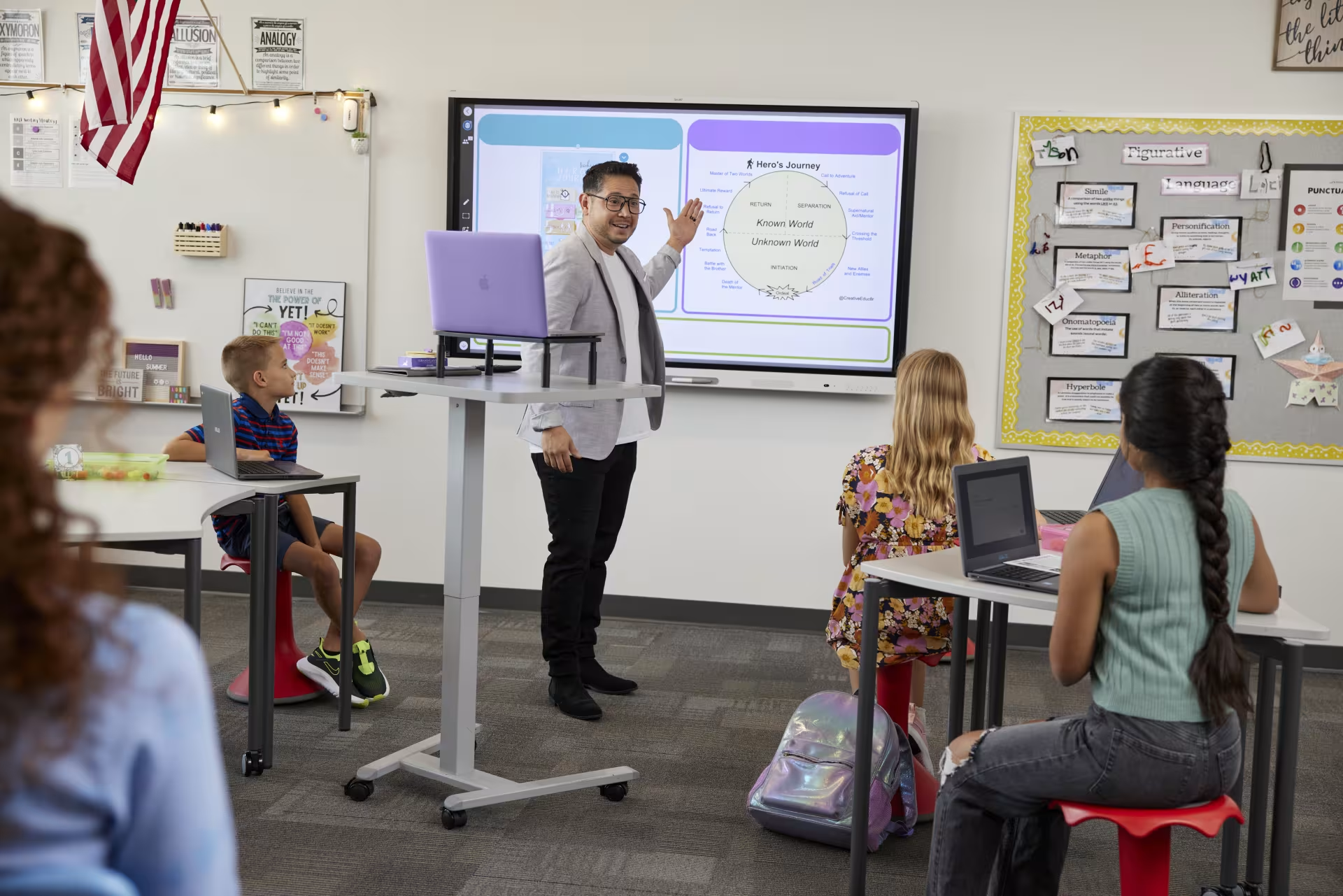
Graduate TESOL Certificate Program
Pursue Your Online TESOL Certificate at GCU
Grand Canyon University offers the Teaching English to Speakers of Other Languages (TESOL) certificate program for licensed teachers and administrators. The program is designed to equip you with the knowledge and skills necessary to teach English language learners of all ages and proficiency levels. Whether you are new to the field of TESOL or have some experience teaching English Language Learning (ELL), this program will provide you with a solid foundation in language teaching theory and practice in or out of the classroom.
The Graduate Certificate in Teaching English to Speakers of Other Languages (TESOL) is a comprehensive program offered by the College of Education. Its specialized coursework offers an opportunity to add to professional credentials and potentially open the door to future employment possibilities. You will engage in a variety of learning activities, including readings, discussions and practical teaching experiences, all designed to enhance your understanding of language teaching and to help you develop effective teaching strategies.

The University will accept one course of the total certificate requirements in transfer.
Credits: Fill out the Lopes Eval to find out what will transfer
Admission Requirements (Master's)
- Undergraduate Degree*
- 2.8+ GPA
OR 2.5+ Unweighted GPA and
- GMAT: 500
- GRE: 300 combined**
Admission requirements may differ based on degree level, program and modality, or transfer status. Some programs of study may require a higher GPA and/or other qualifying criteria for admission. Please review full admission and program requirements in the University Policy Handbook.
* Degree must be from an accredited college or program that has been approved by GCU.
** Combined verbal/quantitative, after August 2011 (1,000 combined verbal and quantitative, prior to August 2011).
Benefits of Earning an Online TESOL Certificate
GCU is a leader in online learning designed for modern adult learners. The TESOL graduate certificate program can fit your working schedule. Learn anywhere at any time from our instructors, who are knowledgeable in their fields.
Earning a certificate in TESOL online offers a range of benefits for individuals seeking flexibility. With only 18 credits to completion, this TESOL certificate online program allows you to study at your own pace and from any location with internet access, making it easier to balance your studies with work, family and other responsibilities. Earning a graduate certificate in TESOL can provide you with the knowledge, skills and credentials needed to pursue a fulfilling career teaching English to learners around the world.
All courses of GCU’s online certificate program meet the standards of the Interstate Teacher Assessment and Support Consortium (InTASC) and are also aligned with the Standards for the Recognition of Initial TESOL Certificate Programs in pre-K–12 ESL Teacher Education.
This Certificate Is Offered Online
Requirements for the TESOL Graduate Certificate Online Program
To apply for this graduate TESOL certificate program, you must have at least one year of teaching experience. It should be documented on the Teaching Verification Form or you may send in your current teaching certificate. You must also have access to a pre-K-12 classroom that includes ESL students. This is a requirement to complete the assignments and the practicum course.
If you’re a non-native English speaker, you can still teach English but it’s important to have evidence of proficiency when applying for jobs. For most employers, non-native English speakers will need to demonstrate a proficiency level of C2, which is the highest level of language proficiency.
Topics and Skills in the Graduate TESOL Certificate Online Program
With this advanced credential, you can prepare to become an educational leader in ESL/TESOL initiatives at the building or district level.
The online TESOL certificate program provides you with the knowledge needed to assist ELL students in overcoming language barriers — enabling ELL students to achieve their full potential in and out of the classroom. Candidates will explore best practices in designing a culturally responsive curriculum, taking into consideration the societal, cultural and familial influences on a student’s learning. The focus of this graduate certificate in TESOL program is to examine the principles, theories and research pertaining to the most effective methods of teaching English to students who are English Language Learners (ELLs).
You will acquire foundational knowledge in these core areas:
Essential building blocks for teaching English language learners
Cultivating collaborative relationships within schools, communities and family connections
Linguistics
Effective strategies for teaching ELL and bilingual students
Second language acquisition
Inclusive approaches to teaching and assessing ELL who may have exceptionalities
Curriculum development
Comprehensive design of effective assessments and tasks
Career Opportunities for TESOL Certificate Holders
As a specialist in ESL/BLE/TESOL learning experiences, you may pursue work in a variety of areas including public or private schools, community colleges, universities, language schools or within school districts. Graduates may work with students at any grade level as an instructor of English as a second language.
In addition to teaching, TESOL certificate holders may also pursue careers that require curriculum development, teacher training or professional development, program administration or educational consulting.(See disclaimer 1) Some even use their graduate certificate in TESOL to find opportunities to work abroad, teaching English in countries around the world.(See disclaimer 2)
Median annual wage of adult basic and secondary education and ESL teachers as of May 2021(See disclaimer 3)
TESOL Certificate Online Program FAQs
We have compiled a list of frequently asked questions about pursuing a TESOL graduate certificate. We hope to provide you with the information you need to make an informed decision about your education and future career.
Is a TESOL certificate worth it?
Is it better to do a TEFL or TESOL certificate?
How hard is it to obtain a TESOL certificate?
Program Curriculum
Core Courses

Take the next steps in helping ESL students get the most from their education. Apply for the TESOL certificate at GCU.
- Indeed (2022, June 24). 9 Jobs You Can Do With a Master’s Degree in TESOL. Retrieved on May 22, 2023.
- Parsons, Tyler (2023, Feb. 9). Will My Master’s Degree Help Me Teach English Abroad? International TEFL Academy. Retrieved on May 22, 2023.
- The earnings referenced were reported by the U.S. Bureau of Labor Statistics (BLS), Adult Basic and Secondary Education and ESL Teachers as of May 2021, retrieved on March 27, 2023. Due to COVID-19, data from 2020 and 2021 may be atypical compared to prior years. The pandemic may also impact the predicted future workforce outcomes indicated by the BLS. BLS calculates the median using salaries of workers from across the country with varying levels of education and experience and does not reflect the earnings of GCU graduates as adult basic and secondary education and ESL teachers. It does not reflect earnings of workers in one city or region of the country. It also does not reflect a typical entry-level salary. Median income is the statistical midpoint for the range of salaries in a specific occupation. It represents what you would earn if you were paid more money than half the workers in an occupation, and less than half the workers in an occupation. It may give you a basis to estimate what you might earn at some point if you enter this career. You may also wish to compare median salaries if you are considering more than one career path. Grand Canyon University can make no guarantees on individual graduates’ salaries as the employer the graduate chooses to apply to, and accept employment from, determines salary not only based on education, but also individual characteristics and skills and fit to that organization (among other categories) against a pool of candidates.
- Montrose, Brett (2023, March 24). TEFL, TESL, TESOL — What’s the Difference? Go Abroad. Retrieved on May 22, 2023.


